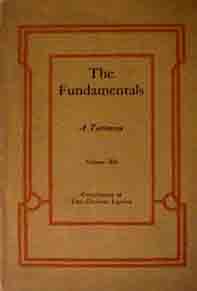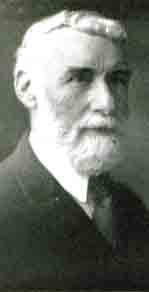
It’s not news to anybody that the evangelical tradition has a high doctrine of Scripture, but a lot of contemporary evangelicals seem to have forgotten what originally generated this commitment to Scripture: the characteristic evangelical experience of God’s power and authority in the text of the Bible. In fact, one of the cherished affirmations of evangelicals has been that the Bible is alive and gives life. When evangelicals talk like that, we are either attributing divine attributes to a text, or we are using extreme shorthand for a whole set of beliefs about how God communes with us through his Son and Spirit in the written word of the Bible. Since book-worship can be ruled out, that leaves only the other explanation: that there is a tacit trinitarianism at work in the evangelical approach to Scripture.
The happy hunting ground for witnesses to this trinitarian approach to Scripture is the nineteenth century, which was in some ways a golden age of evangelical spirituality. However, it can be found even among those evangelicals of the early twentieth century who were girding their loins for battle with modernism: the original fundamentalists. In particular, we can look to The Fundamentals themselves. These books were published serially in twelve volumes over the course of several years, and sent free of charge to Christian workers around the world. The 1917 republication of The Fundamentals, under the editorial hand of R. A. Torrey, consisted of 90 essays printed in 4 volumes. Torrey put the essays into an orderly sequence in this edition, making The Fundamentals, if not quite a systematic theology, then at least a popular synthesis of conservative biblical scholarship, theology, and apologetics.
An understated trinitarianism is characteristic of The Fundamentals as a whole. It is perhaps surprising that in ninety chapters, there is not a chapter on the Trinity. Uncharitable interpreters of The Fundamentals (and there have been hardly any sympathetic scholarly interpretations in recent decades) have taken this conspicuous absence as evidence of the imbalance and narrowness of The Fundamentals project. But the uncharitable reading is too facile to fit the case. Lacking a Trinity chapter, The Fundamentals nevertheless exhibit a robust evangelical trinitarianism, from Charles Erdman’s “The Holy Spirit and the Sons of God” to R. A. Torrey’s presentation of “The Person of the Holy Spirit.” And the tacit trinitarian theology of The Fundamentals can also be seen in its presentation of the doctrine of Scripture.
 The longest chapter in the series is by Philip Mauro, and is entitled “Life in the Word.” Among the other eighty-nine chapters are presentations on inspiration and inerrancy, and numerous chapters on specific historical-critical issues. But the doctrine of Scripture is most elaborately spelled out in Mauro’s chapter. What, therefore, is the doctrine of Scripture in The Fundamentals? It is summed up and organized around the word Life. Mauro says: “It is clear, then, that when we read, “The Word of God is living,” we are to understand thereby that it lives with a spiritual, an inexhaustible, an inextinguishable, in a word a divine, life. If the Word of God be indeed living in this sense, then we have here a fact of the most tremendous significance.” Mauro unpacks that significance by working through a list of characteristics of “being alive.” “We look then at the Written Word of God to see if it manifests characteristics which are found only in living things, and to see if it exhibits, not merely the possession of life of the perishable and corruptible sort with which we are so familiar by observation, and which is in each of us, but life of a different order, imperishable’ and incorruptible.” Indeed, Mauro says, Scripture has the following characteristics of life:
The longest chapter in the series is by Philip Mauro, and is entitled “Life in the Word.” Among the other eighty-nine chapters are presentations on inspiration and inerrancy, and numerous chapters on specific historical-critical issues. But the doctrine of Scripture is most elaborately spelled out in Mauro’s chapter. What, therefore, is the doctrine of Scripture in The Fundamentals? It is summed up and organized around the word Life. Mauro says: “It is clear, then, that when we read, “The Word of God is living,” we are to understand thereby that it lives with a spiritual, an inexhaustible, an inextinguishable, in a word a divine, life. If the Word of God be indeed living in this sense, then we have here a fact of the most tremendous significance.” Mauro unpacks that significance by working through a list of characteristics of “being alive.” “We look then at the Written Word of God to see if it manifests characteristics which are found only in living things, and to see if it exhibits, not merely the possession of life of the perishable and corruptible sort with which we are so familiar by observation, and which is in each of us, but life of a different order, imperishable’ and incorruptible.” Indeed, Mauro says, Scripture has the following characteristics of life:
It has perennial freshness
It is non-obsolete and always contemporary
It is indestructible
It is a discerner (a “critic,” Hebrews 4:2) of hearts and minds
It is remarkably translatable
It lodges in hearts and grows
It transforms other life
But Mauro especially dwells on how the Bible gives life. “Indeed, the great purpose of the Written Word is to impart life — even eternal (that is to say divine) life — to those who are dead through trespasses and sins.” Mauro distinguishes between living, life-giving truth, that is, the truth which makes the Bible the word of God, and every other kind of truth. “Never yet has any man been heard to testify that he had been the wretched and hopeless slave of sin, and had continued in spiritual darkness, fast bound in misery and vice until his eyes were opened by the great truth that two and two make four, or that three angles of a triangle are equal to two right angles; and that thereby his life had been transformed, his soul delivered from bondage, and his heart filled with joy and peace in believing.” What, finally, are the implications of the life of the Bible? “Thus the Word of truth becomes, in some inscrutable way, the vehicle for imparting that life of which the risen Christ, the Incarnate Word, is the only Source.”
Mauro is no Adolph Saphir, and he doesn’t manage to bring the Christological and pneumatological threads so closely together in his argument. Exegesis does drive him into this territory, but it is oblique: “Other Scriptures testify with equal clearness to the great and glorious truth that those who are begotten of the Spirit, through the incorruptible seed of the Word, receive a nature of the same sort as that of the Divine Source of their life. In the eighth chapter of Romans there is a section devoted to the “sons of God,” in whom the Spirit dwells (verses 9—16) ; and of these it is declared that God predestinated them “to be conformed to the image of His Son, that He might be the first-born among many brethren” (verse 30).”
What is trinitarian about Mauro’s doctrine of Scripture? Mauro’s example of evangelical Bible reading is trinitarian in that, through the category of “life,” he accounts for the divinity of Scripture by appeal to the Son and Spirit in salvation. This is what can be found in The Fundamentals. If this is fundamentalism, let us have more of it!